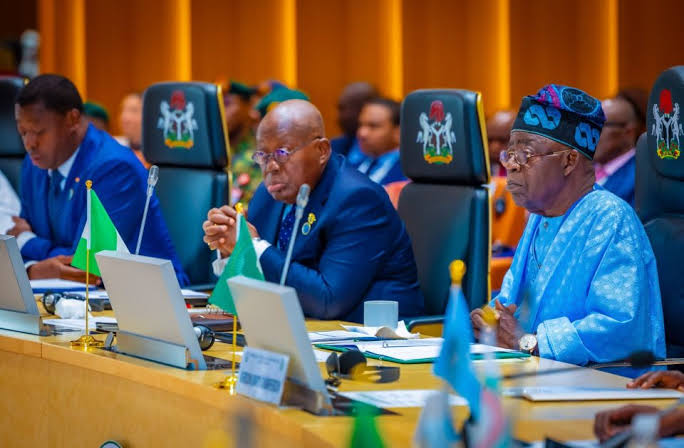President Bola Tinubu has urged the Economic Community of West African States (ECOWAS) to prioritize the establishment and sustenance of a regional standby force aimed at bolstering security and fostering economic advancement. Speaking at the 65th Ordinary Session of the Authority of ECOWAS Heads of State and Government in Abuja, Tinubu stressed the urgency of this initiative amid growing security threats in the region.
“The Regional Action Plan against Terrorism has already improved cooperation in training, intelligence sharing, and humanitarian interventions,” Tinubu remarked. He pointed out that the recent meeting of Finance and Defense Ministers in Abuja was a step forward in raising funds to activate the ECOWAS Standby Force, which is essential for counter-terrorism efforts. According to Tinubu, member countries are demonstrating their commitment to combating insecurity by increasing their defense budgets to acquire necessary equipment and ensure readiness.
Tinubu emphasized that a secure environment is crucial for the region to achieve its full potential. “Operationalizing the ECOWAS Standby Force (ESF) requires not just political will but substantial financial resources,” he said. He urged member states to provide the necessary resources to meet the expectations and recommendations set forth by their Defense and Finance Ministers, aimed at countering insecurity and stabilizing the region.
Leveraging Nigeria’s Counter-Terrorism Expertise
The Nigerian President also highlighted the capabilities of Nigeria’s National Counter-Terrorism Centre (NCTC), which has been recognized as one of the best in Africa. Tinubu proposed making the NCTC a regional center to enable all ECOWAS member states to benefit from its capacity-building and other related opportunities. This move, he suggested, would enhance the collective ability to address security challenges more effectively.
“Nigeria, under my leadership, is committed to leading by example in remitting its collected levies to the organization,” Tinubu affirmed. However, he also stressed the need for ECOWAS management to reduce its overhead expenditures and focus on programs and activities that directly impact the lives of the citizens.
“I am aware of the progress report on the implementation of the ECOWAS Institutional Reforms. I, therefore, call on the President of the ECOWAS Commission to expedite the conclusion of the second phase of the Institutional Reforms, aimed at reducing the organization’s operational costs,” Tinubu added.
Commitment to Democratic Principles
Welcoming a new member to the Authority, Senegalese President Bassirou Faye, Tinubu extended congratulations to the government and people of Senegal for their steadfast commitment to democratic governance. He commended Senegal for its recently concluded presidential election, which has been widely praised as free, fair, transparent, and credible. This achievement, Tinubu noted, is a testament to the region’s dedication to the principles of democracy, good governance, and the rule of law.
During the session, Tinubu addressed the ongoing security and political challenges within the region, including the threat of terrorism and violent extremism. He acknowledged that the political landscape remains fragile in some member states, particularly those that have experienced unconstitutional changes in government. Tinubu called for unity within the ECOWAS community to overcome these challenges and to work towards elevating the region from poverty to prosperity.
In his closing remarks, Tinubu sought support for the re-election of Ambassador Bankole Adeoye as AU Commissioner for Political Affairs, Peace, and Security in February 2025. He praised Adeoye’s contributions and leadership, expressing confidence that his re-election would benefit the region.
ECOWAS Commission President’s Response
In response, the President of the ECOWAS Commission, Dr. Omar Alieu Touray, thanked Tinubu for his leadership and dedication. He noted that the exit of Burkina Faso, Mali, and Niger from ECOWAS would affect the citizens of these countries and other ECOWAS nations, particularly regarding the need for visas and the review of all trade and development agreements, including ongoing ECOWAS projects in those countries.
Touray emphasized the importance of maintaining a collaborative and proactive approach to address the challenges facing the region. He echoed Tinubu’s call for unity and commitment to the principles of democracy and good governance, essential for achieving lasting peace and prosperity in West Africa.
Source: Punch


